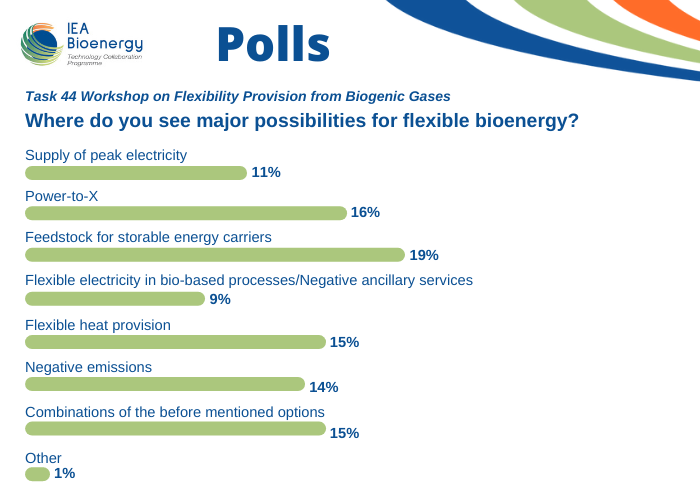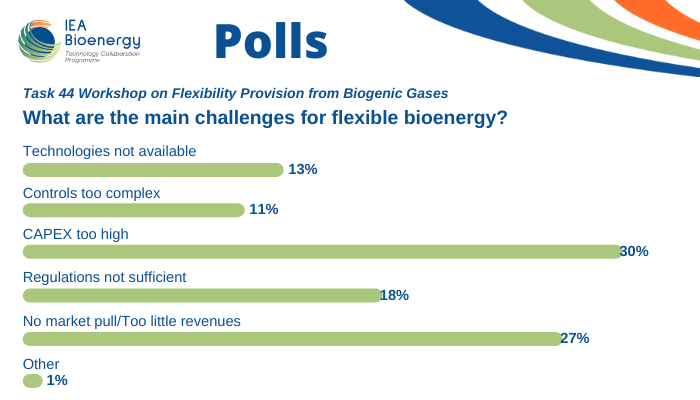IEA Bioenergy Task 44 Workshop on Flexibility provision from biogenic gases
Increasing shares of variable renewable energy (VRE) in the energy supply system create a demand for measures to provide flexibility at different time scales on a sustainable manner. At the same time, the Russian invasion of Ukraine has strengthened the demand for sustainable domestic resources to guarantee security of supply in Europe. Bioenergy has inherent capabilities to provide both of these features as it can shift resources regarding time and place as well as between sectors. IEA Bioenergy Task 44 focuses on the development and analysis of bioenergy solutions that can provide flexible resources for a low-carbon energy system. The objective is to improve understanding on the types, quality and status of flexible bioenergy, and to identify barriers and future development needs in the context of the entire energy system.
This workshop focused in particular on technology options and Best Practices to provide flexibility from biogenic gases through gasification, biogas and Power-to-X pathways. The workshop was organized in collaboration with IEA Bioenergy Tasks 33 (Gasification) and 37 (Biogas), and aimed at learning and discussing technology options to provide flexibility from biogenic gases, barriers and drivers for their implementation and end-user demands.
After a brief introduction to the topic of flexible bioenergy by Task 44’s Task leader Elina Mäki of VTT in Finland, the online workshop participants were asked where they see major possibilities for flexible bioenergy. In line with Elina’s introduction, the participants did recognize the broad potential of flexible bioenergy, with all possible answers receiving a similar number of votes (see the figure below).

Subsequently, the floor was given to three representatives from industry. Tuukka Hartikka of Helen, the energy company of Helsinki, Finland stressed the importance of intimate sector coupling in a future sustainable energy (and materials) system. Bio-based energy carriers, biogenic CO2 and hydrogen (from solar and wind) are seen as the major options for the different sectors and to create sufficient flexibility. Theresa Schubert of Wien Energie in Austria indicated that a multitude of technologies will be needed to cover future energy demands in the Vienna region. To create sufficient energy storability and system flexibility, she stressed in particular the need to incorporate gasification using bio-based and urban waste feedstock. To this purpose, a gasification demonstration project has been initiated. The third presenter from industry, Markus Jöcker of Siemens Energy in Sweden, provided an extensive overview of the flexibility Siemens Energy can provide to the energy system by making their gas turbine fleet suitable for high efficiency conversion of a wide range of renewable feedstock in power and CHP applications. The wide feedstock range currently includes biogas, biodiesel, 40-75% hydrogen and 50% cracked ammonia, with further R&D aimed at 100% hydrogen, ammonia, FAME and methanol/ethanol.
Then, Tilman Schildhauer of PSI, the Swiss representative in Task 44, gave a structured overview of the various technology options for flexible bioenergy, distinguishing (existing, emerging and future) long-term flexibility services (storage as chemical energy / upgrading) and short-term flexibility services (back-up / peak generation, negative ancillary services). When asked in a second online question about the main challenges for flexible bioenergy, the participants indicated that non-technical challenges (e.g., financial ones like high CAPEX and no market pull/too little revenues, and regulatory ones) may be even more prominent than the technical ones, which seems a relevant topic for a future workshop (see the figure below).

With the technology focus of the current workshop, Berend Vreugdenhil of TNO in the Netherlands, Task leader of Task 33 (Gasification), and Jan Liebetrau of Rytec in Germany, Task leader of Task 37 (Biogas), dived into the potential of gasification and biogas plants to provide flexibility to the energy system. Berend sketched the potential of gasification as a flexible platform technology for the provision of multiple products (e.g., green gas, methanol/DME and biofuels via Fischer-Tropsch synthesis (biodiesel, biojet) from a wide feedstock range. He highlighted several ongoing projects incorporating the option of combining gasification with renewable hydrogen to maximize bio-based carbon utilization. Given the envisaged scarcity of renewable hydrogen and the many competing applications, it appears most attractive to use hydrogen for boosting the production of biojet, since there the hydrogen requirements are relatively limited and the aviation sector surely is difficult to “green” otherwise. An important notion from Jan’s presentation was that, instead of being merely seen as a treatment plant for organic wastes, biogas plants are now seen as an integral part of new energy systems. Options have been developed to increase flexibility in individual plant operation (e.g., feeding management, increased gas storage and capacity of CHP) but also by bundling individual biogas plants into virtual power plants. However, flexibility may come at a cost, and these costs should be covered.
Finally, moderator and Dutch Task 44 representative Jaap Kiel of TNO in the Netherlands, together with the speakers summarized the workshop and drew main conclusions. All agreed that for a cost-effective and efficient future sustainable energy system with large shares of variable renewable energy (VRE), multiple (bio-based) technology options are needed to create sufficient short-term and long-term flexibility. All energy sectors, not just the power sector, should be considered. A wide spectrum of technologies is already in place at different technology readiness levels and commercial readiness levels – all of them will be needed, but a framework showing the best fit for different technologies is needed. Moreover, proper and stable financial incentives and regulatory measures should be put in place to boost the market introduction of these technology options.
AGENDA and PRESENTATIONS
Moderator: Jaap Kiel, TNO
Intro for Task 44 and flexible bioenergy
Keynotes: Challenges in bio-based energy systems – The end-user perspective
Overview on concepts for flexibility from bioenergy
Technical options for flexible bioenergy
Discussion and conclusions
- Jaap Kiel, TNO
- Jan Liebetrau, Rytec
- Berend Vreugdenhil, TNO
- Tuukka Hartikka, HELEN
- Teresa Schubert, Vienna Energy
- Marcus Joker, Siemens


